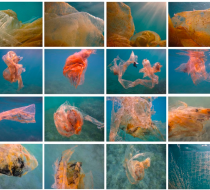Plastic Waste 4 Favorite
The political artist I chose to investigate is Ruth Peche, a Spanish sculptor and photographer. Her themes tend to center around plastic waste and the impact it has on the environment, using this as a muse for describing the relationship human society has with the natural world. Peche’s interest in art activism, particularly with themes of preserving the environment, is something that was sparked for her in during her childhood years. Peche grew up with one foot in the city and one foot in the wilderness. Though her family was from Madrid, they frequently took trips to the country and rural areas where she was fully immersed in nature. This not only sparked her love for the natural world, but she began to take note of the dramatic contrast between nature and urban life.
Peche has taken on many projects, all of which address excessive pollution caused by humans, and to make the public aware of the consequences of not addressing these problems. She also tries to express the detrimental effects of humanity trying to bend the natural world to their will. Many of her artworks have undertones of a post-environmental-catastrophe dystopian world. However, Peche still manages to make these guilt-inducing art projects breathtakingly beautiful. She has multiple photography series’ about plastic in the ocean, where plastic is manipulated to imitate marine life such as jellyfish, coral, and sea kelp. In these photos by Peche, it is hard to distinguish that these photos are actually of plastic because they are so beautiful and so realistic. This can be interpreted as Peche’s was of showing how something so terrible is becoming so normal to us that it seems to blend in with the beauty of the ocean.
Peche’s artwork aims to make a point about how humans treat the planet and to remind the viewers not to be desensitized to the amount of pollution in the world. When someone looks at her art, their first thought is “What a beautiful photograph of a jellyfish!” But after closer inspection, the observer’s next thought is “oh, that’s actually a plastic bag.” Then after, the realization will hit them that this might be where we end up going if we continue down the path we are currently on. The observer’s following thought is panicked: “This might be the future of the ocean, marine life being replaced by plastic. And could land life be next?” This reminds the observer how real this problem is and that we should not become numb to it. People can be so used to seeing terrifying facts about global warming that it no longer affects them. There is so much other news about horrible things going on in the world that the issue of climate change can easily get lost among them. Since the effects are not always as visible to us as other problems, the environment is often put on the back burner as something that we will have to deal with in the future instead of now. Peche knows this is not the case, and conveys it to the observer with her art about plastic waste already making up a big part of our world.







